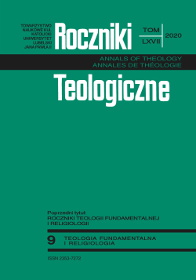Human Plurality and Finitude and Divine Infiniteness and Openness for the Maius and the New
Abstract
Descartes’ slogan “Cogito ergo sum” determines modern thinking by emphasizing the “ego”. Consequently, many people, living in their individual concrete historical setting, tend to become the absolute subjects and masters of their own lives, with their thinking and behavior independent of any other. We call the various factors of their biography – place and date of birth, gender, language, profession, religious affiliation, etc. – “the context”, a term that we borrow from modern biblical exegesis. The vast plurality of egos, however, makes us aware of the existence of innumerable other egos, which – from one’s own point of view – are non-egos; we call them “you” or “we”.
Subsequently, the development of modern Western thought is described in view of the concept of “a person”. In the Western thought “a person” is mainly understood as an individual, although in medieval philosophy and theology, it implies individuality and relationality. The difficulty of translation of the term “person” in different cultural surroundings is demonstrated with reference to the Japanese language.
We reach the full understanding of other people only if we come to know their limitations, especially in science and technology, and if we restore our sense of the infinite. The Canadian philosopher Charles Taylor reminds us that, in today’s world, not all people have completely abandoned their faith of God and live by radical self-determination, but that there are still quite a few who expect their fulfilment in a life of selflessness, embedded in the hope for a new life to come from the Totally-Other, which we call “God”, and working in solidarity for reconciliation, peace and justice.
References
Denken, das Weite atmet. Text und Kontext in der Theologie, Hg. Günter Riße, Klaus Vellguth. Ostfildern: Grünewald, 2017.
Rahner, Karl. Schriften zur Theologie. Bd. VII: Zur Theologie des geistlichen Lebens. Einsiedeln: Benziger, 1966 (= Sämtliche Werke. Bd. 23, Freiburg: Herder, 2006).
Riebel, Alexander. In Die Tagespost [Würzburg] 9.11.2019. Internetzugang: 26.03.2020. https: //www.die-tagespost.de/gesellschaft/kultur/Gott-lieben-ist-der-Endzweck;art4881,202854
Waldenfels, Hans. Absolutes Nichts. Zur Grundlegung des Dialogs zwischen Buddhismus und Christentum. Mit einem Geleitwort von Keiji Nishitani. Freiburg: Herder, 1976 (erweiterte Version, Paderborn: Bonifatius-Verlag, 2013).
Waldenfels, Hans. In-Between. Essays in Intercultural and Interreligious Dialogue. Bangalore: Dharmaram Publications, 2011.
Waldenfels, Hans. Kontextuelle Fundamentaltheologie. 4. Auflage. Paderborn: Verlag Ferdinand Schöningh, 2005 [O Bogu, Jezusie Chrystusie i Kościele – dzisiaj: teologia fundamentalna w kontekście czasów obecnych. Katowice: Księgarnia św. Jacka, 1993].
Waldenfels, Hans. Rückwärts blickend vorwärts schauen. Zeitbetrachtungen zu Christentum und Menschsein, Religionen, Kulturen und Gesellschaft. Theologische Versuche. Bd. 4. Paderborn: Bonifatius-Verlag, 2016.
Copyright (c) 2020 Roczniki Teologiczne

This work is licensed under a Creative Commons Attribution-NonCommercial-NoDerivatives 4.0 International License.





